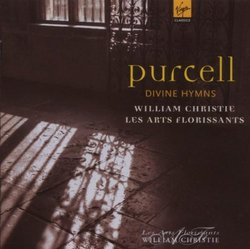Thank God for William Christie...and Henry Purcell
Robert L. Neill | 12/05/2007
(5 out of 5 stars)
"This is one of the most ravishingly beautiful albums of baroque vocal music ever made. It is wonderful to hear that Christie and Les Ars Florissants, now a generation old, are still the best ensemble of their kind around and absolutely at the top of their game."
From Plaintive to Plangent by Way of Penitent
Giordano Bruno | Wherever I am, I am. | 10/13/2008
(5 out of 5 stars)
"There was little or no joy in England between 1620 and 1720, between the lusty Elizabethans and the gorgeous Georgians. There wasn't much occasion for joy, we ought to note, what with the wars of religion, regicide, unprecedented class struggle, suppression of the various Celtic fringes, etc, plus the ascendancy of a religious dogma - Calvinism - that regarded earthly happiness with disdain. My assessment is based chiefly on music. 17th Century English music scarcely rivaled the emotional magnificence of Italy (Scarlatti, Carissimi, Caldara) or France (Lully and Co.) or Germany ( Schuetz, Rosenmuller, Buxtehude, Pachelbel, Schmelzer, Biber...). Even the jigs and hornpipes of not-so-jolly England were composed in minor modes, and melancholy tinged the masques of the mighty.
The texts of these 16 "Divine Hymns" by English composers of the 17th C are chiefly lamentations and pleas for mercy. The sense of sinful unworthiness is overwhelming. Here's # 9, by Pelham Humfrey:
Lord, I have sinned, and the black number
Swells to such a dismal sum,
That should my stony heart, and eyes,
And this whole sinful trunk a flood become,
And run to tears, their drops could not suffice
To count my score, much less to pay...
And the music is equally plangent, nearly always in minor keys with tempi ranging from stately to funereal. Even Henry Purcell's "O All Ye People, Clap Your Hands" avoids any imputation of the sin of exuberance.
Nevertheless, this is a performance of rare delicacy and artifice -- a clouded beauty, like the poems of John Milton, but a concert you'll want to listen to again and again. William Christie has assembled a troop of English singers to mask as Les Arts Florissants, with the desirable result of making the diction fit the music perfectly. He accompanies them with a basso continuo of theorbo, viola da gamba, and harpsichord. These are Baroque cantatas, in short, dressed up in Puritan sobriety. The composers are Henry Purcell, John Blow, William Croft, and Pelham Humfrey, with Purcell accounting for ten of the sixteen pieces. The longest single piece is Purcell's "In Guilty Night", a ten-minute dramatic oratorio depicting the meeting of King Saul with the Witch of Endor and the ghost of Samuel. It's a powerfully emotive scene.
I think this is a CD worth risking my credibility on: a must-hear performance. After all, if Bill Christie is ready to risk his credibility on music by Pelham Humfrey, who am I to hesitate?"
Avoid this one
Music lover | Michigan | 03/24/2009
(2 out of 5 stars)
"Magnificent music, well programmed; excellent singing, and by and large good instrumental playing too. But Christie has no sense of the rich austerity of this music, little idea about how to pace it, and no feeling for its nuanced drama. He adopts for the most part a simple interpretive strategy, and it seems to be something like this: to make everything sound as much as possible like a dance by Lully. The most egregious example is Purcell's `Hosanna in the Highest', like so many pieces on the disk taken at a strangely jaunty pace, and marred by Christie's intrusive and trivializing continuo playing. The result is to conceal not only the inherent beauty of the music, but to strip it of all dramatic effect (as in, for example, the exquisite entry of the tenor at the beginning of the final stanza `Be ravish'd earth'). Christie's approach to the more obviously `stagey' numbers tends to the grotesquely histrionic; any subtlety is lost in Christie's coarse and mono-dimensional interpretations. The worst examples are perhaps Purcell's `The Blessed Virgin's Expostulation' (where Christie clearly noticed that one emotion Purcell expresses is hysteria - but what a shame that Christie failed to notice the rest) and `A Divine Hymn' (where Christie evidently asked Paul Agnew to affect a kind of tremulous quiver, presumably lest the listener fail to grasp the wonder that is so evidently found in words and music). Constantly shifting tempi add to the mess. Highlights: Christie has less scope to harm the anthemns, and these are generally better done. And the greater dramatic scope of `In Guilty Night' makes it more amenable to Christie's operatic approach than the smaller numbers are. But overall this recording is simply a shame: the same music, with the same performers, but under different direction would have made a marvellous disk."


 Track Listings (16) - Disc #1
Track Listings (16) - Disc #1